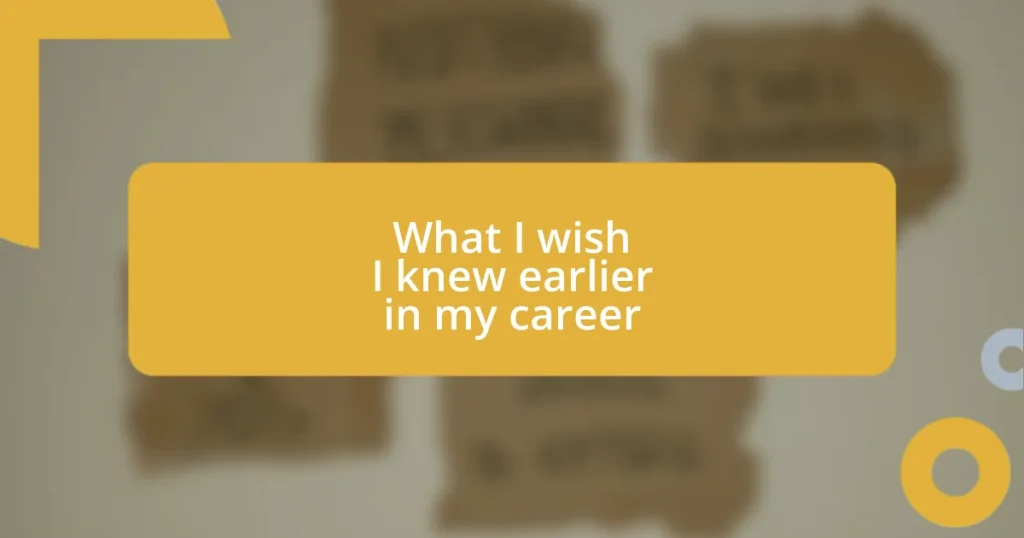Key takeaways:
- Networking is essential for career growth, providing access to opportunities, mentorship, and emotional support.
- Failures should be embraced as learning experiences that foster resilience and innovation, ultimately leading to personal and professional development.
- Effective time management and continuous learning are crucial strategies for enhancing productivity and adapting to changes in the workplace.

Key lessons from my journey
Reflecting on my journey, one key lesson stands out: the importance of networking. Early in my career, I often thought that hard work alone would pave my way to success, but I quickly learned that building relationships is just as crucial. Have you ever found yourself in a room full of strangers, feeling like an outsider? I remember walking into my first industry event, terrified, yet it was there that I met a mentor who would guide me through some of my toughest professional challenges.
Another vital takeaway has been embracing failures as part of the growth process. I once faced a major project setback that felt like the end of the world. In hindsight, it was a turning point that taught me resilience and the importance of adapting my approach. Isn’t it fascinating how our most daunting experiences often shape our future success? That failure pushed me to innovate and seek out creative solutions, ultimately leading to the best project I ever completed.
Lastly, I’ve realized the significance of self-care in maintaining long-term career satisfaction. There was a time when I prioritized work over everything else, burning out after a particularly demanding period. Can you relate to that feeling of exhaustion when you’ve given your all? When I finally decided to set boundaries and take breaks, I experienced a profound boost in my creativity and productivity—proof that caring for ourselves is not just an indulgence but a necessity for sustainable success.

Importance of networking for growth
Networking is the bridge that connects us to opportunities we might not find on our own. I’ve often been surprised by how one conversation can open doors I didn’t even know existed. For instance, at a casual coffee catch-up with an old colleague, I learned about a job opening that perfectly matched my skill set. If I hadn’t taken the time to nurture that relationship, I might have missed out on a fantastic career advancement.
To illustrate the significance of networking, here are some key points to consider:
- Relationship building: Networking is about creating genuine connections that can provide support and guidance throughout your career journey.
- Opportunity access: Many jobs are never advertised; they are filled through word-of-mouth or referrals. This highlights why having a diverse network is beneficial.
- Mentorship potential: Engaging with seasoned professionals can lead to mentorship opportunities, offering insights that can shape your career path.
- Industry insights: Conversations with peers can give you a better understanding of industry trends and practices, keeping you informed and competitive.
- Emotional support: Building a network creates a community that can support you during challenging times, fostering a sense of belonging in your professional life.

Skills that boost career success
One of the most essential skills that can boost career success is effective communication. I used to underestimate the power of clear and concise messaging. There was a time when my emails were lengthy and complicated. This often led to confusion among my colleagues. Once I learned to communicate more directly, I witnessed an increase in collaboration and productivity. Have you ever noticed how simple changes in communication can shift the dynamics of teamwork?
Another critical skill is adaptability. Early in my career, I became rigid in my ways, and when faced with unexpected changes, I struggled to keep up. It wasn’t until a sudden shift in project scope forced me to rethink my approach that I realized the importance of being flexible. Now, I embrace change as a chance to grow and innovate. Doesn’t it feel empowering when you’re able to pivot quickly in response to new demands?
Lastly, strong problem-solving abilities can set you apart from others in your field. I remember a day when our team faced a significant obstacle that threatened to derail a project. Instead of panicking, I took a step back, evaluated the situation, and proposed a creative workaround. That experience not only saved the project but also helped build my reputation as a reliable problem-solver. Have you ever had a moment where your quick thinking made all the difference? In moments like those, we prove our value in ways that resonate throughout our careers.
| Skill | Importance |
|---|---|
| Effective Communication | Enhances teamwork and reduces misunderstandings. |
| Adaptability | Allows for quick response to changes and challenges. |
| Problem-Solving | Demonstrates value and reliability through overcoming obstacles. |

Embracing failures as learning opportunities
Failure is often viewed as a setback, but I’ve come to see it as one of the best teachers I’ve encountered. There was a project early in my career where I missed a critical deadline due to a lack of organization. Instead of feeling defeated, I reflected on what went wrong. This experience taught me how to prioritize my tasks and manage my time more effectively. Have you ever turned a failure into a way to reassess your methods?
I remember a pitch that I truly believed in but ultimately fell flat. At that moment, I felt embarrassed and disheartened. However, upon deconstructing my approach, I discovered that I hadn’t fully understood my audience’s needs. This revelation was pivotal; it ignited a curiosity in me to learn more about the art of persuasion and audience analysis. In what ways have your missteps led you to grow in unexpected ways?
Adopting this mindset of embracing failures transformed my outlook on challenges. With every misstep, I’ve gained tools that have empowered my professional journey. It’s almost exhilarating to think that each failure is just a stepping stone toward improvement. If I hadn’t viewed those moments as learning opportunities, imagine how stagnant my growth would have been! This perspective shift encourages resilience, fostering a sense of determination that propels us forward.

Time management for better productivity
Time management has been a game changer in my productivity. I vividly remember when I struggled to juggle multiple tasks, leading to late nights and overwhelming stress. It wasn’t until I started using tools like calendars and to-do lists that I began to see real progress. How often do we underestimate the value of a simple schedule?
Another pivotal moment for me was learning to prioritize my tasks effectively. I used to dive into the most urgent work, often neglecting strategic projects that could yield greater benefits. Once I began to focus on what truly mattered—by assessing my long-term goals alongside daily demands—I noticed a significant boost in my output. Have you ever stopped to consider which tasks align with your overall objectives?
Incorporating time-blocking techniques into my routine has also been incredibly beneficial. By dedicating specific periods for focused work, I found that I could maintain higher levels of concentration and creativity. This approach minimizes distractions and allows me to dive deep into tasks without interruption. How has structure influenced your own time management practices? Embracing these strategies transformed my productivity, proving that even small shifts can lead to significant results.

Continuous learning and adaptation strategies

Continuous Learning and Adaptation Strategies
One of the most impactful decisions I’ve made was to cultivate a habit of continuous learning. Early on, I found myself getting too comfortable with what I already knew, without seeking to expand my horizons. It wasn’t until a colleague introduced me to industry podcasts that I realized how much I was missing out on. The knowledge I gained reignited my passion and made me eager to apply new concepts. Have you ever found inspiration in unexpected places?
Attending workshops and networking events also became crucial stepping stones in my journey. I distinctly remember a conference that led to a chance encounter with a mentor who opened my eyes to unexplored areas in my field. That connection ultimately fueled my desire to adapt and grow in ways I hadn’t anticipated. Have you ever considered how networking might present opportunities for learning?
I’ve also embraced the power of feedback, both giving and receiving it. I used to shy away from critiques, feeling vulnerable and defensive. However, learning to see feedback as a gift changed everything for me. It turned out to be an excellent way to adapt my approach and improve my skills. This experience taught me that growth often comes from those who see us in ways we might not see ourselves. How can you leverage feedback to propel your own development?















